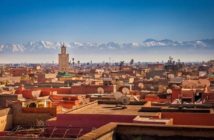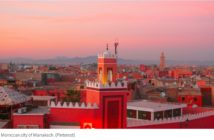Morocco’s Fellah Hotel is an artist’s residence, literacy center, and a preschool.
By DANA THOMAS
![[image]](http://si.wsj.net/public/resources/images/OB-TN018_mag071_G_20120625142809.jpg) Photographs by Matthieu SalvaingA view of the Fellah Hotel’s open-air restaurant and bar from across the swimming pool.
Photographs by Matthieu SalvaingA view of the Fellah Hotel’s open-air restaurant and bar from across the swimming pool.
Nestled in an ancient village at the foot of the Atlas Mountains is one of Morocco’s most remarkable luxury resorts. The Fellah Hotel, a cluster of mud-colored buildings surrounded by lush palm gardens and olive groves, is not merely a lovely getaway. It’s also home to Dar al-Ma’mûn, a nonprofit arts center dedicated to bringing international contemporary art to Morocco, as well as Moroccan and Arab culture to the local community and the developed world. The couple behind the project—Redha Moali, a French-born 38-year-old of Algerian descent, and his wife, Houria Afoufou, a Casablanca-born actress raised in France—wanted to create a place steeped in culture and creativity that could do good works. “But we needed a way to finance it—a good business plan,” Moali explains. “This was the equation we figured out.”
Four years ago, as international stock markets crashed and the financial crisis set in, Moali, who worked as a stockbroker in Geneva, became fed up with finance. “I could no longer live with my colleagues who couldn’t wait to spend their bonuses on new watches and other expensive things they didn’t need. I wanted to break from all of that.”
Photographs by Matthieu SalvaingDecorations in the hotel rooms include flea-market finds.
Feeling the pull of their North African roots, Moali and Afoufou visited an 11-acre property owned by Afoufou’s family in Tassoultante, a farming village half an hour outside of Marrakech. Though neither had any experience as hoteliers or philanthropists, they bought the land and began construction on a 60-room hotel, cultural center and library. Afoufou was in charge of design, creating 10 Berber-style villas with spacious rooms and suites filled with midcentury flea-market finds and modern pieces she commissioned from local craftsmen.
Moali took care of the management side, hiring chef Olivier Dechaise from France’s Périgord region to create a contemporary Moroccan cuisine for the restaurant; Valentin Green, a Versailles-trained landscaper, to turn the plain of scrub into desert gardens, a kitchen garden and an orchard; Julien Amicel, a native of Bordeaux who worked for a Paris contemporary art center, to run Dar al-Ma’mûn; and Casablanca-born Omar Berrada, to oversee the library and translation center. Bucking convention further, Moali skipped the usual Moroccan hammam, or European-style spa, and instead brought in Thai-massage therapists trained at the Wat Po temple in Bangkok to practice their craft and also teach the art of Thai massage to the public. “Asia has a more harmonious relationship between body and spirit than the Occident does,” Moali says. “And this was a way to bring the Far East here, to create an encounter of these two cultures.”
While the beautiful hotel is the main draw, the art center is the couple’s true passion. Named for a ninth-century Baghdad caliph who created a “house of wisdom,” Dar al-Ma’mûn is as ambitious as it is generous. Three times a year, the center launches an international call for applications for its artist-in-residence program—last session, it received more than 500—and a jury of prominent international arts-community members selects four applicants to spend three to five months at the center, all expenses paid, plus a $6,000 stipend, to work on their proposed projects. During their stay, the artists meet with critics, gallery owners and museum curators, and mingle with hotel guests.
The center is also working to improve literacy and education in Morocco in conjunction with the Casablanca-based Zakoura education foundation and Libraries Without Borders, a French NGO. The library, which is open to the public, now contains 3,000 children’s books and 5,000 books for adults, in French, Arabic and English, a mix of fiction and nonfiction that focuses on the humanities. A translation program brings important Arabic works to the Western world, and vice-versa, and welcomes prominent academics as writers in residence.
The center has several community-outreach programs, such as a preschool for 250 local children (there are no other preschools in Morocco); tutoring for elementary school students aimed at lowering the dropout rate, which in agricultural villages like Tassoultante can be high; and a literacy program for local women—so far, 40 have enrolled, and another 100 are on the waiting list. “There are 32 million people in Morocco, and 60 percent of them live in rural areas,” says Moali. “They cannot succeed if they’re not integrated into society, if they don’t learn the basics, such as reading and writing.”
Interaction with the village is the couple’s highest priority. “I wanted to be able to say hello to the people in the street,” says Afoufou, “not just remain behind our walls, living in luxury.” They have hired dozens of villagers to work at the Fellah (which means “farmer” in Arabic), and they buy produce from neighboring farmers for the hotel, raising the average income of their suppliers from $125 to $750 a month. Last winter, Elín Hansdóttir, an artist from Iceland, built an installation called Mud Brick Spiral, a circular maze of locally made bricks and mirrors, on an empty field in the village. Almost instantly, village children turned it into a playground. Since then, Dar al-Ma’mûn has used the site for public programs, including a reading by New York poet Anne Waldman accompanied by Korean-American cellist Ha-Yang Kim. Soon, Moali and Afoufou will build a children’s education center there.
The most ambitious project, however, is the upcoming construction of the Dar al-Ma’mûn building, a 43,000-square-foot center across the street from the hotel that will serve as the permanent home for the artist-in-residence program (the two villas currently in use will revert to the hotel), as well as house a large exhibition space, a 150-seat theater, and a university-quality library with space for 100,000 books. Dar al-Ma’mûn’s head librarian, Omar Berrada, is overseeing the library’s design—greatly inspired, he says, by Columbia University’s Butler Library, where he spent many hours as an exchange student—and he believes it will become Africa’s preeminent arts-research center.
Although Moali has funded most of the project himself so far, he hopes that soon the hotel will underwrite a portion of Dar al-Ma’mûn’s running costs. He has also set up a nonprofit foundation in Switzerland to receive donations. Looking back at all he and his wife have achieved in three years, Moali is quietly taken aback.
“Never did I imagine it would grow so big, so fast,” he says. “Of course, I knew nothing about any of this when I started, other than knowing that I wanted to help.” With afternoons spent lounging by the immense, sapphire-blue pool and long, fire-lit dinners under a clear starry sky, it’s also a lovely place for a holiday.
Read more: http://online.wsj.com/article/SB10001424052702304765304577482602388074364.html#ixzz1zCo4HGy4
.




![[SB10001424052702304870304577489023185092722]](http://s.wsj.net/public/resources/images/OB-TN019_mag071_D_20120625142927.jpg)


